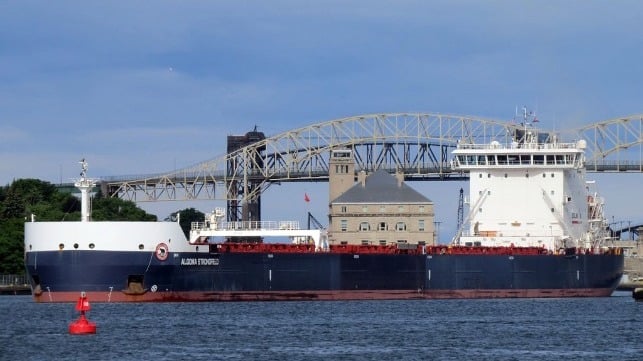Canadian Shipping Company Fined for Clean Water Act Violations

A Canadian shipping company was fined half a million dollars and sentenced to three years’ probation after pleading guilty in a Western New York court to violating the Clean Water Act. As part of the probation, the shipping company, Algoma Central Corporation, must implement an environmental compliance plan. The case stemmed from a 2017 incident in which approximately 11,887 gallons of unprocessed oily bilge water were released into Lake Ontario.
Algoma, in St. Catharines, Ontario, owns and operates a fleet of self-unloading and gearless dry-bulk carriers transporting bulk cargoes of raw materials, including iron ore, grain, salt, cement, gypsum, and aggregates, on the Great Lakes and St. Lawrence Seaway. The company said that it had been an accidental discharge by crew members that were not aware the tank in question contained oily water and as soon as it was discovered other crew members ordered the discharge immediately stopped. After the incident, the company also reported the discharge to U.S. and Canadian authorities.
“The very purpose of the Clean Water Act is to protect our natural resources, including one of our nation’s greatest natural treasures, the Great Lakes, from harm,” said U.S. Attorney James P. Kennedy for the Western District of New York speaking after the sentencing. “This conviction and the fine imposed sends a strong message that those who violate the Clean Water Act will be held accountable for their actions. This penalty also ensures that this defendant will be monitored in the future and will be strictly obligated to comply with those environmental laws and regulations that protect our waters, our fisheries, our wildlife, and each of us.”
An investigation by the U.S. Coast Guard Investigative Service reported that Algoma’s 740-foot laker the Algoma Strongfield was transiting Lake Ontario on June 6, 2017, when the third officer requested permission to empty the contents of a wash water tank into Lake Ontario, and the captain approved the discharge. Another unspecified Algoma employee learned of the discharge and informed the third officer and captain that the wash water tank contained unprocessed oily bilge water and instructed them to stop the discharge immediately.
A trial attorney Patrick Duggan of the U.S. Justice Department’s Environment and Natural Resources Division’s Environmental Crimes Section and Assistant U.S. Attorney Aaron Mango of the Western District of New York contended in prosecuting the case that Algoma and some of its employees had been aware that the tank contained oily bilge water. They also said that the company had negligently failed to inform the third officer and the captain about the contents of the tank.
The U.S. attorneys reported that the oily water had been accumulated in the wash water tank since the vessel’s delivery voyage began at the beginning of April 2017. Algoma had acquired the ship along with others that were being built for the Canadian Wheat Board after Nantong Mingde Heavy Industry Company which was building the ships went bankrupt. Algoma hired Redwise Maritime Services, a vessel transport company based in the Netherlands to crew the ship then registered in Tuvalu and sail it from China to Canada where it was handed over to Algoma and re-registered in Canada.
During that delivery voyage, the oily water separator and oil content monitor malfunctioned or failed on multiple occasions the USCG report stated resulted in an accumulation of unprocessed oily bilge water. On May 5, 2017, an Algoma employee directed Redwise to transfer and store the unprocessed oily bilge water in the Strongfield’s unused wash water tank. During the remainder of the delivery voyage, the Redwise crew made several additional transfers of unprocessed oily bilge waste into the wash water tank.
According to the USCG, the wash water tank was intended to store deck and cargo hold wash water and is not listed on the Strongfield’s International Oil Pollution Prevention certificate. The crew elected to use it to avoid an overboard discharge of unprocessed bilge water.

that matters most
Get the latest maritime news delivered to your inbox daily.
An Algoma employee boarded the vessel on May 19, 2017, while it was transiting the Panama Canal, and he would later become the vessel’s chief engineer. The attorneys said that he was advised of the oily bilge water situation. Algoma assumed operation of the vessel and placed its crew aboard when the Strongfield arrived in Sept-Iles, Quebec, Canada.
The Environment and Natural Resources Division charged that Algoma acted negligently in failing to inform all the crewmembers boarding the ship and the inspectors of the contents of the wash water tank.
